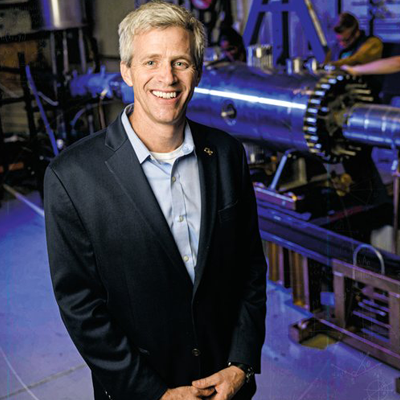Tim Lieuwen: Shaping the Future of Research at Georgia Tech
Lieuwen enters the role of interim EVPR with plans to focus on research security and operational excellence and to strengthen the Institute’s ties to Georgia and the Southeast.
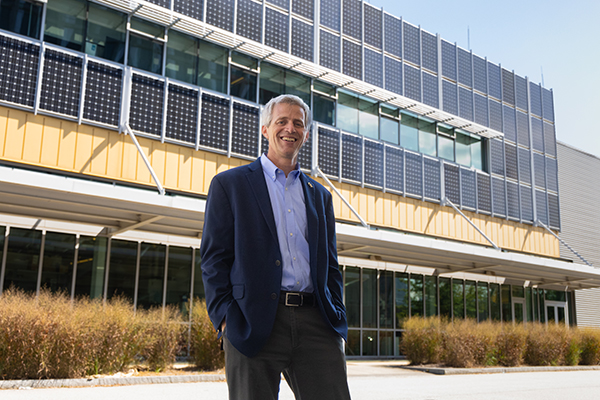
Stepping into the position of interim executive vice president for Research (EVPR) is just the latest role in which Tim Lieuwen has served Georgia Tech. Since 2012, he has been executive director of the Strategic Energy Institute (SEI), one of Tech’s largest Interdisciplinary Research Institutes; in 2023, he added the role of interim chair of the Daniel Guggenheim School of Aerospace Engineering (AE). He has brought boundless energy and ideas to every position.
Lieuwen arrived at the Institute intending it to be merely a stop along the way in his academic career. But he never left after earning his master’s (1997) and Ph.D. (1999) in mechanical engineering, and he has received numerous honors and recognition for his work in clean energy systems and policy, national security, and regional economic development. Lieuwen is a Regents’ Professor, the David S. Lewis, Jr. Chair in AE, a member of the National Academy of Engineering, and a fellow of the American Society of Mechanical Engineers and the American Institute of Aeronautics and Astronautics, among several others.
When President Ángel Cabrera announced Lieuwen’s EVPR appointment, he noted, “Tim’s extensive experience and knowledge of Georgia Tech makes him uniquely suited to lead our research enterprise as we search for a permanent EVPR. I am grateful for his willingness to serve the Institute during this period of remarkable growth.”
In the following interview, Lieuwen describes how his previous leadership roles on campus have prepared him to serve as interim EVPR, his goals for the Institute’s research enterprise, and how growing up as the middle child with six siblings shaped his collaboration skills.
“I enjoy building collaborations. I really enjoy working with others and thinking about ways to support them.”
You’re a proud alumnus of Georgia Tech, and you’ve said before that “Georgia Tech took a chance on me.” What do you mean by that?
TL: I’ve always liked mechanical things; I’ve always known I wanted to be an engineer. I had my own business in junior high repairing small engines. My dad was an engineer, but we had a small farm and a 140-year-old farmhouse, so I grew up working in the woodshop and the metal shop, always building and repairing stuff. Part of me wasn’t sure I wanted to go to college; I thought maybe I would just be a machinist. But ultimately I went to college because I wanted to design cool, high-tech stuff. I ended up going to a small, private Christian school, Calvin College in Grand Rapids, Michigan, where I received a rigorous education. I’m deeply thankful for the liberal arts education I got there, and the appreciation it gave me for the humanities, including history, philosophy, psychology, and reading great books.
But the reason I say Georgia Tech took a chance on me is because I came from a school that no one here had heard of, rather than an elite university. When I was finishing at Calvin, I applied to several graduate programs, including Georgia Tech. Bill Wepfer, who was the school chair of mechanical engineering at the time [now professor emeritus], flew me down to Atlanta and offered me a graduate assistantship. Georgia Tech was the only university that made such an offer.
When I finished my Ph.D., a faculty position came open in aerospace engineering. Usually, people leave or get a postdoc position, but I decided to try to become a faculty member. Again, Georgia Tech took a big chance on me. They made me an offer, and I became an assistant professor right out of grad school.
After that, Steve Cross, when he was the executive vice president for Research 12 years ago, asked me to be the executive director of the Strategic Energy Institute. I hadn’t yet had significant leadership roles on campus, but he took a chance on me. I feel so grateful for all three of those opportunities.
How have your previous roles — whether as the aerospace engineering interim school chair, the SEI executive director, or others — prepared you for stepping into the role of interim EVPR?
TL: Running the Strategic Energy Institute has been helpful in understanding and contributing to the complex interplay of science, technology, policy, and how people influence change in the messiness of democracy. Georgia Tech’s energy faculty have domain expertise that increasingly informs major federal programs around clean energy, manufacturing, and critical minerals. Understanding how to engage and partner with the federal government proactively has been invaluable, and I aim to bring that to Georgia Tech more broadly. We’re already participating in broader think tanks and national policy discussions around significant programs for health, security, and sustainability.
Serving as SEI executive director has deepened my understanding of local communities, the city, and the state, and how to be an effective partner with these entities, particularly as a state institution in service to Georgia.
“Our faculty are hardworking and very productive, and I want to make sure our research organization supports them so they can focus on what they are uniquely good at.”
How can the federal-level strategies you mentioned be applied to state-level impact and relationships?
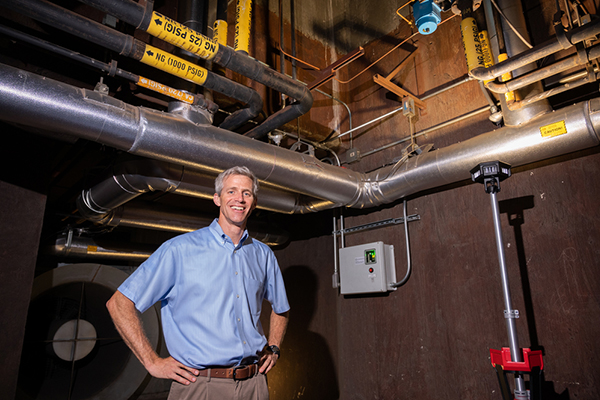
TL: Even as we think about global and national problems, our region has its own distinctive resources, politics, and people. Technology in service to place — our place, the Southeast — is more important to Georgia Tech now than ever. This applies to areas like rural health, national security, sustainability, and coastal resilience.
We don’t have an ivory tower at Georgia Tech; we have a brick tower. We exist in the service of society. We’re already making a difference in our city, state, and region, but I’d like to see this become more systemic. It shouldn’t be just a few points of light but a broad-based approach.
An article about you in the Atlanta Business Chronicle described your ability to work with people at all different levels and called you “a master of collaboration.” How did this skill develop?
TL: [laughing] I have no idea. Perhaps it’s because I grew up in a big family, in a house with one bathroom, with six brothers and sisters. Being a middle child in a big family, you learn a lot of negotiation skills. I enjoy building collaborations. I really enjoy working with others and thinking about ways to support them — I don’t do well in win-lose or zero-sum game negotiations. Instead, my approach is, “How can I help you?”
Describe your leadership philosophy.
TL: People-centered first. I start with a strategy, help identify challenges and roadblocks, and support people in getting the work done. I believe in saying thank you along the way.
When your tenure as interim EVPR is complete, what do you hope to have accomplished?
TL: First, I would say, is a people-centric approach. Over the last few years, I’ve chaired Research Next, the Institute's strategic plan for research. We’re now operationalizing a lot of that. One example is the Research Leaders Academy, which focuses on developing research leaders to lead larger-scale activities, contribute to societal conversations, influence federal policy, and work with local cities.
Additionally, we’re working on better communicating the Institute’s impact to legislators and thinking about how regional and state economic development influences our research strategy.
Third — and this isn’t glamorous — research security issues will continue to be increasingly important, simply because of our growing size and global geopolitics. I’ll be working on organizing our research enterprise to proactively support the research security expectations of our stakeholders.
Last, a big focus will be on operational excellence — also not glamorous but super important. Our faculty are hardworking and very productive, and I want to make sure our research organization supports them so they can focus on what they are uniquely good at.
Is there anything else you want to mention?
TL: I feel so grateful to Georgia Tech. I came here for grad school in 1999 and stayed — I’ve found a community and friends. I’ve been married for 30 years and raised four children here. Georgia Tech is a high-level, non-elitist place that gives everyone an opportunity. I’m honored to be in this role and excited about the chance to give back.
This interview has been edited for length and clarity.

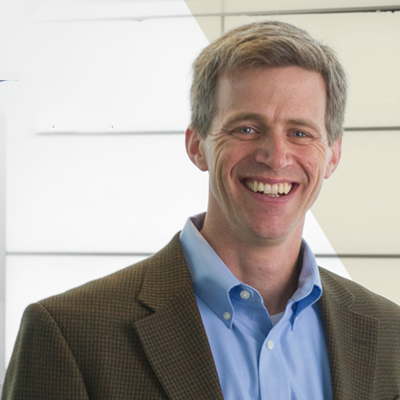
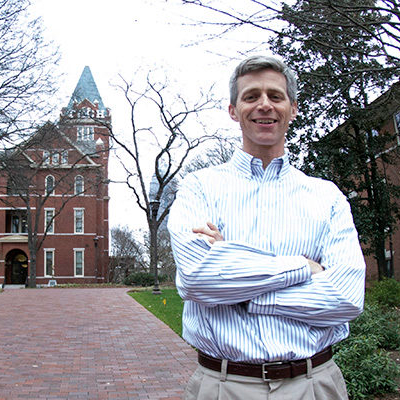 A profile of AE’s newest NAE member: Professor Timothy Lieuwen
A profile of AE’s newest NAE member: Professor Timothy Lieuwen